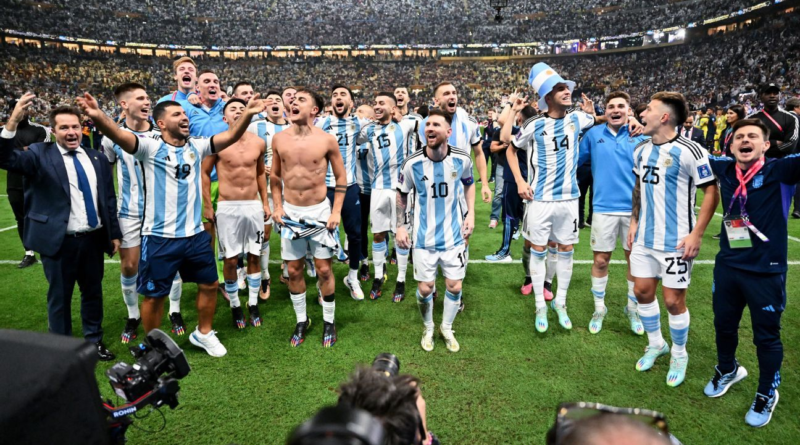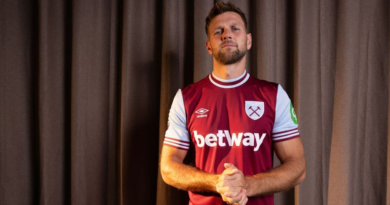All-time classic World Cup final crowns Messi's glorious career
Argentina are World Cup winners for the third time, with Lionel Messi inspiring the Copa America champions to glory, following a penalty shootout win at the end of an incredible final against France in Qatar on Sunday.
– World Cup 2022: News and features | Bracket | Results
Kylian Mbappe became only the second player to score a World Cup final hat trick, eclipsing Messi’s two strikes in the match, but despite his goals helping France to a 3-3 result after extra time, shootout misses by Kingsley Coman and Aurelien Tchouameni meant Argentina celebrated victory in Lusail.
JUMP TO: Player ratings | Best/worst performers | Highlights and notable moments | Postmatch quotes | Key stats | Upcoming fixtures
Rapid reaction
1. Messi crowns incredible career with World Cup win
Lionel Messi’s incredible career is now complete. The Argentina captain has finally added a World Cup winners’ medal to all of the Champions Leagues, domestic championships and cups and the Copa America he won with Argentina in 2021.
And he did in in style. Two goals in a dramatic final, plus a successful penalty in the shootout, mean that Messi did everything possible to deliver long-awaited glory for Argentina. He also won the Golden Ball award as the best player of the tournament.
Will it end the GOAT debate? Probably not. There will always be those who favour Cristiano Ronaldo, Diego Maradona and Pele over the 35-year-old, but now that he has a World Cup win on his list of honours, you can bet that Messi won’t care in the slightest about the endless debate over who really is the greatest of all time.
But the most important thing for Messi is that nobody can ever point to the one big trophy missing from his career. He has not only now lifted it, he drove and inspired Argentina to success, just as Maradona did in Mexico in 1986.
Qatar 2022 has been Messi’s tournament. He has scored in every game bar one — the group stage win against Poland when he had a penalty saved by Wojciech Szczesny — and he has risen to the occasion every time Argentina has needed him to make a difference.
Big goals against Mexico and Australia, amazing assists for Nahuel Molina and Julian Alvarez against Netherlands and Croatia respectively and, in the final against France, he set Argentina on the way to victory by scoring a first-half penalty.
It has been the perfect tournament for Messi in every sense. The perfect embellishment to an unrivalled career.
2. Mbappe’s brilliance was not enough for France
Kylian Mbappe has already won one World Cup for France, and he almost won a second single-handedly against Argentina.
His two goals in the space of 97 seconds in the final 10 minutes of the game gave France a lifeline after they had trailed 2-0 since the first half, and the Paris Saint-Germain star then added a third to claim his hat trick in extra time. But despite Mbappe’s heroics — he also netted his spot kick in the shootout — France couldn’t become the first team to win back-to-back World Cups since Brazil in 1962.
With the France squad being hit by a virus in the buildup to the game, it was a remarkable achievement for Les Bleus to be able to fight back from two goals down to take the game to penalties. Raphael Varane, Ibrahima Konate, Dayot Upamecano, Adrien Rabiot and Kingsley Coman were all unable to train on Friday, and three of them — Varane, Upamecano and Rabiot — started the game.
The lack of energy was evident for most of the game until Mbappe gave them hope with an 80th-minute penalty. They were so bad in the first half that Deschamps substituted Olivier Giroud and Ousmane Dembele before the interval and it didn’t get much better in the second half. Even Antoine Griezmann, one of the players of the tournament, failed to see out the game with Deschamps replacing him with 20 minutes to go.
A final is when the big players show up and make the difference, but France’s top stars went missing until Mbappe exploded into life on 80 minutes. But despite almost carrying his team to glory, Mbappe couldn’t take France all the way. He now has the unenviable distinction of scoring a hat trick in a World Cup final and still ending up on the losing side.
3. Argentina’s triumph a win for a whole continent
Argentina ended South America’s 20-year wait for a World Cup win by defeating reigning champions France in Qatar.
Not since Brazil won their fifth World Cup in 2002 has a South American team lifted the trophy, but by doing so, Argentina have brought an end to European dominance of the tournament. Italy, Spain, Germany and France have all won the World Cup since a South American nation and only Argentina — in 2014 — have made it to the final since 2002.
But with so many of the game’s leading players coming from Brazil, Argentina, Uruguay and Colombia, it is a huge morale boost for the continent of South America to finally have a world champion again.
And with the hosting rights for the 2030 World Cup still to be decided, the impact made by Argentina on and off the field in Qatar should help the South American challenge to host the tournament in eight years’ time.
South American fans have been the largest contingent by far in Qatar. It is a hugely passionate football region, and the prospect of Argentina and Uruguay co-hosting the centenary World Cup in 2030 — 100 years after the latter beat the former 4-2 in the inaugural final as hosts in Montevideo — can only have been helped by Messi’s team winning this tournament.
Player ratings (1 = worst, 10 = best)
Argentina: Emiliano Martinez 8; Nahuel Molina 6, Cristian Romero 7, Nicolas Otamendi 6, Nicolas Tagliafico 7; Enzo Fernandez 8, Rodrigo De Paul 8, Alexis Mac Allister 8; Lionel Messi 8, Julian Alvarez 7, Angel Di Maria 8.
Subs: Marcos Acuna 6, Gonzalo Montiel 6, Leandro Paredes 6, Lautaro Martinez 6, German Pezzella 6, Paulo Dybala 6.
France: Hugo Lloris 7; Jules Kounde 4, Raphael Varane 6, Dayot Upamecano 5, Theo Hernandez 5; Aurelien Tchouameni 6, Adrien Rabiot 6; Ousmane Dembele 3, Antoine Griezmann 5, Kylian Mbappe 9; Olivier Giroud 4.
Subs: Marcus Thuram 7, Randal Kolo Muani 8, Kingsley Coman 6, Edouardo Camavinga 6, Youssouf Fofana 6, Ibrahima Konate 6, Axel Disasi 6.
Best and worst performers
BEST: Kylian Mbappe
He was quiet for the most of the game, but the big players deliver when it matters. Mbappe turned the World Cup final on its head by scoring twice in the space of 90 seconds in the closing stages before claiming a hat trick with his extra-time penalty.
WORST: Ousmane Dembele
Gave away the penalty for Argentina’s opener with a clumsy challenge on Di Maria. Didn’t contribute anything positive and was even worse than Jules Kounde on France’s woeful right flank.
Highlights and notable moments
After his team went two goals down, France coach Didier Deschamps had seen enough. With four minutes until the end of the first half he made a double substitution. Dembele and Olivier Giroud were the ones hauled off, and the latter did not take it well.
Kylian Mbappe’s second-half brace then forced the match into extra time, when he followed up his penalty with this goal just seconds later.
MBAPPE ARE YOU SERIOUS?! 😱
FRANCE TIES IT pic.twitter.com/qZLzNz3aow
— FOX Soccer (@FOXSoccer) December 18, 2022
Messi and Mbappe both scored again in extra time, taking the match to a shootout, where Gonzalo Montiel was the unlikely hero.
ARGENTINA WINS THE 2022 FIFA WORLD CUP 🇦🇷
THE GREATEST MEN’S FIFA WORLD CUP FINAL OF ALL TIME pic.twitter.com/xp1N6DkLjA
— FOX Soccer (@FOXSoccer) December 18, 2022
After the match: What the players and managers said
Postmatch quotes will appear here…
Key stats (provided by ESPN Stats & Information)
Messi’s opener was the first goal or assist he had recorded in a final in his senior Argentina career. His penalty was the sixth to be taken in a men’s World Cup final (excluding shootouts). Only one of them was not converted — Antonio Cabrini vs. West Germany in 1982, although Italy still won that match.
Of the 20 previous men’s teams to score first in the World Cup final, 12 went on to lift the trophy. Only one team has trailed by two or more goals in the World Cup final and gone on to win it before the final in Qatar — West Germany in 1954 vs. Hungary.
All three of Argentina’s goals were scored by players aged 34 years or older (Di Maria 34, Messi 35). Prior to this, the only players of that age to score in a World Cup final had been Nils Liedholm for Sweden in 1958 (35) and Zinedine Zidane for France in 2006 (34). At 35 years and 177 days, Lionel is the second-oldest man to score in a World Cup final, after Liedholm (35 years, 264 days) in 1958 vs. Brazil.
France is the first team in men’s World Cup history to make multiple first-half substitutions in the final. The only other first-half substitutes in World Cup finals were one in 1982 (Italy), two in 1994 (one each by Brazil and Italy) and one in 2014 (Germany).
With his first goal, Kylian Mbappe became only the second man to score in back-to-back World Cup finals, after Brazil’s Vava in 1958 and 1962. With his second, Mbappe became the first to score seven goals at a World Cup since Ronaldo scored eight for Brazil in 2002.
There was a gap of just one minute and 37 seconds between Mbappe’s two goals, the first time that goals had been scored in consecutive minutes in a men’s World Cup final.
This was the eighth men’s World Cup final to go to extra time, with only two of the previous seven going to penalties. However, it was the fourth World Cup final to require an additional 30 minutes in the 21st century (2006, 2010, 2014, 2022), as many times as in the 20th century.
With Lautaro Martínez’s introduction from the bench, a player from Bayern Munich and a player from Inter Milan has featured in each of the last 11 World Cup finals. Bayern’s Dayot Upamecano started the match for France.
Mbappe’s third goal made him only the second man to score a hat trick in a World Cup final, after Geoff Hurst for England in 1966, and it secured him the World Cup Golden Boot award as top scorer with eight goals.
With 172 goals scored, this is the World Cup with the most goals ever. There were 171 scored in 1998 and 2014.
Messi has won every competition he’s appeared in more than once. The only competition he has played in and not won is the Coupe de France, in which he has made one appearance.
Up next
Argentina: The new world champions get to party and celebrate their triumph with no upcoming matches on their schedule for 2023 just yet. However, most of them will soon be back in action for their clubs with the Premier League resuming on Dec. 26. The second halves of the LaLiga and Ligue 1 seasons will also begin before the end of the year, meaning it might not be long before we see Messi and Mbappe back together at Paris Saint-Germain.
France: They may feel like it right now, but France don’t have long before they have to begin qualification for Euro 2024. The road to Germany begins on March 24 when Netherlands visit the Stade de France, before Les Bleus travel to face Republic of Ireland three days later.




